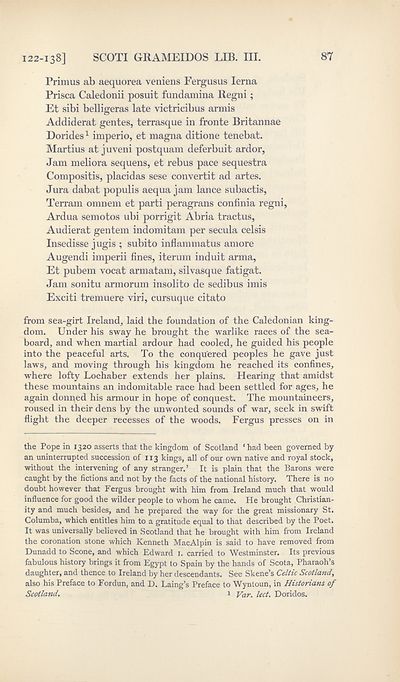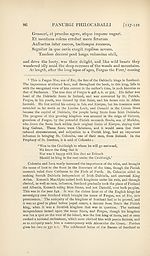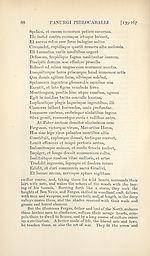Series 1 > Grameid: an heroic poem descriptive of the campaign of Viscount Dundee in 1689, and other pieces
(158) Page 87
Download files
Complete book:
Individual page:
Thumbnail gallery: Grid view | List view

87
122-138] SCOTI GRAMEIDOS LIB. III.
Primus ab aequorea veniens Fergusus lerna
Prisca Caledonii posuit fundamina Regni;
Et sibi belligeras late victricibus armis
Addiderat gentes, terrasque in fronte Britannae
Dorides1 imperio, et magna ditione tenebat.
Martins at juveni postquam deferbuit ardor,
Jam meliora sequens, et rebus pace sequestra
Compositis, placidas sese convertit ad artes.
Jura dabat populis aequa jam lance subactis,
Terram omnem et parti peragrans confinia regni,
Ardua semotos ubi porrigit Abria tractus,
Audierat gentem indomitam per secula celsis
Insedisse jugis ; subito inflammatus amore
Augendi imperii fines, iterum induit arma,
Et pubem vocat armatam, silvasque fatigat.
Jam sonitu armorum insolito de sedibus imis
Exciti tremuere viri, cursuque citato
from sea-girt Ireland, laid the foundation of the Caledonian king¬
dom. Under his sway he brought the warlike races of the sea¬
board, and when martial ardour had cooled, he guided his people
into the peaceful arts. To the conquered peoples he gave just
laws, and moving through his kingdom he reached its confines,
where lofty Lochaber extends her plains. Hearing that amidst
these mountains an indomitable race had been settled for ages, he
again donned his armour in hope of conquest. The mountaineers,
roused in their dens by the unwonted sounds of war, seek in swift
flight the deeper recesses of the woods. Fergus presses on in
the Pope in 1320 asserts that the kingdom of Scotland ‘had been governed by
an uninterrupted succession of 113 kings, all of our own native and royal stock,
without the intervening of any stranger.’ It is plain that the Barons were
caught by the fictions and not by the facts of the national history. There is no
doubt however that Fergus brought with him from Ireland much that would
influence for good the wilder people to whom he came. He brought Christian¬
ity and much besides, and he prepared the way for the great missionary St.
Columba, which entitles him to a gratitude equal to that described by the Poet.
It was universally believed in Scotland that he brought with him from Ireland
the coronation stone which Kenneth MacAlpin is said to have removed from
Dunadd to Scone, and which Edward 1. carried to Westminster. Its previous
fabulous history brings it from Egypt to Spain by the hands of Scota, Pharaoh’s
daughter, and thence to Ireland by her descendants. See Skene’s Celtic Scotland,
also his Preface to Fordun, and D. Laing’s Preface to Wyntoun, in Historians of
Scotland. 1 Var. led. Doridos.
122-138] SCOTI GRAMEIDOS LIB. III.
Primus ab aequorea veniens Fergusus lerna
Prisca Caledonii posuit fundamina Regni;
Et sibi belligeras late victricibus armis
Addiderat gentes, terrasque in fronte Britannae
Dorides1 imperio, et magna ditione tenebat.
Martins at juveni postquam deferbuit ardor,
Jam meliora sequens, et rebus pace sequestra
Compositis, placidas sese convertit ad artes.
Jura dabat populis aequa jam lance subactis,
Terram omnem et parti peragrans confinia regni,
Ardua semotos ubi porrigit Abria tractus,
Audierat gentem indomitam per secula celsis
Insedisse jugis ; subito inflammatus amore
Augendi imperii fines, iterum induit arma,
Et pubem vocat armatam, silvasque fatigat.
Jam sonitu armorum insolito de sedibus imis
Exciti tremuere viri, cursuque citato
from sea-girt Ireland, laid the foundation of the Caledonian king¬
dom. Under his sway he brought the warlike races of the sea¬
board, and when martial ardour had cooled, he guided his people
into the peaceful arts. To the conquered peoples he gave just
laws, and moving through his kingdom he reached its confines,
where lofty Lochaber extends her plains. Hearing that amidst
these mountains an indomitable race had been settled for ages, he
again donned his armour in hope of conquest. The mountaineers,
roused in their dens by the unwonted sounds of war, seek in swift
flight the deeper recesses of the woods. Fergus presses on in
the Pope in 1320 asserts that the kingdom of Scotland ‘had been governed by
an uninterrupted succession of 113 kings, all of our own native and royal stock,
without the intervening of any stranger.’ It is plain that the Barons were
caught by the fictions and not by the facts of the national history. There is no
doubt however that Fergus brought with him from Ireland much that would
influence for good the wilder people to whom he came. He brought Christian¬
ity and much besides, and he prepared the way for the great missionary St.
Columba, which entitles him to a gratitude equal to that described by the Poet.
It was universally believed in Scotland that he brought with him from Ireland
the coronation stone which Kenneth MacAlpin is said to have removed from
Dunadd to Scone, and which Edward 1. carried to Westminster. Its previous
fabulous history brings it from Egypt to Spain by the hands of Scota, Pharaoh’s
daughter, and thence to Ireland by her descendants. See Skene’s Celtic Scotland,
also his Preface to Fordun, and D. Laing’s Preface to Wyntoun, in Historians of
Scotland. 1 Var. led. Doridos.
Set display mode to:
![]() Universal Viewer |
Universal Viewer | ![]() Mirador |
Large image | Transcription
Mirador |
Large image | Transcription
Images and transcriptions on this page, including medium image downloads, may be used under the Creative Commons Attribution 4.0 International Licence unless otherwise stated. ![]()
| Scottish History Society volumes > Series 1 > Grameid: an heroic poem descriptive of the campaign of Viscount Dundee in 1689, and other pieces > (158) Page 87 |
|---|
| Permanent URL | https://digital.nls.uk/126597453 |
|---|
| Attribution and copyright: |
|
|---|
| Description | Over 180 volumes, published by the Scottish History Society, containing original sources on Scotland's history and people. With a wide range of subjects, the books collectively cover all periods from the 12th to 20th centuries, and reflect changing trends in Scottish history. Sources are accompanied by scholarly interpretation, references and bibliographies. Volumes are usually published annually, and more digitised volumes will be added as they become available. |
|---|


